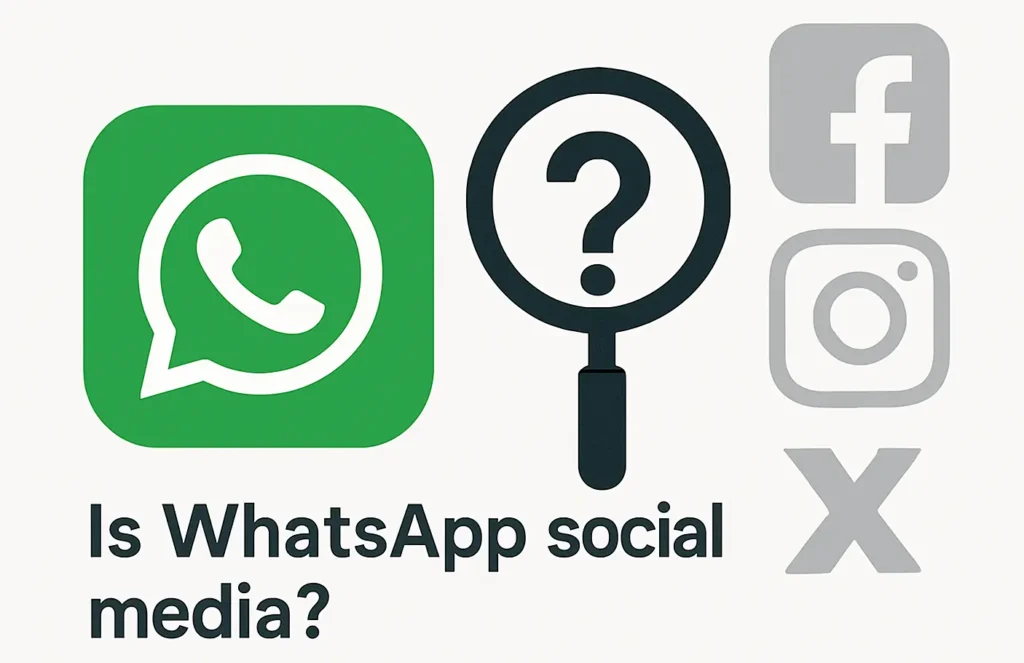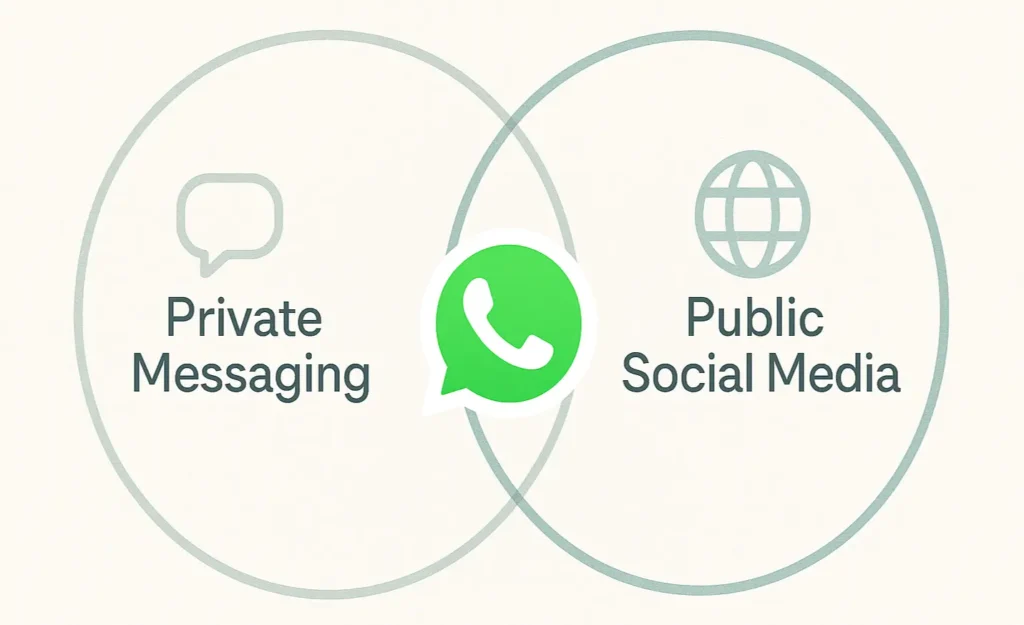Is WhatsApp a Social Media Platform? Explained for Businesses

While WhatsApp enables social connection through groups, Status updates, and media sharing, its core focus remains private, end-to-end encrypted messaging between known contacts. This distinction, particularly the lack of public profiles or discovery feeds, makes it best described as a “social messaging app” rather than a typical social media platform.
Key Takeaways
- The core difference lies in its architecture: WhatsApp is a closed, private network for known contacts, whereas traditional social media platforms are open, public networks designed for discovery.
- WhatsApp’s primary function is one-to-one or one-to-few communication, contrasting with the one-to-many broadcast model of platforms like Facebook or Instagram.
- For businesses, this distinction is critical; the strategy for WhatsApp focuses on direct engagement, customer service, and nurturing, not on building public brand awareness.
- The introduction of WhatsApp Business and the WhatsApp Business API has transformed the app from a simple communication tool into a powerful platform for commerce and customer relations.
- While not a traditional social platform, its immense user base and high engagement rates make it an absolutely essential channel in a modern marketing strategy.
Table of Contents
The Great Debate: Is WhatsApp Social Media?
In a world saturated with digital communication channels, the lines between them often blur. This is especially true for WhatsApp. With over two billion users, it is a global communication giant. It allows you to share photos, videos, and status updates with your contacts, and you can form large groups around shared interests. These features certainly have a “social” flavor, leading many to wonder, is WhatsApp a social media platform in the same vein as Facebook or TikTok?

The answer is nuanced, and for a business, understanding this nuance is critical to using the platform effectively. While it facilitates social interaction, its fundamental purpose and architecture are starkly different from what we traditionally define as social media. This guide will break down the key differences, explain why this classification matters, and explore how your business can leverage the unique power of WhatsApp as the ultimate tool for direct customer engagement. This is a key part of a modern digital strategy. As a forward-thinking digital marketing agency, we believe that mastering this channel is a significant competitive advantage.
The Case for WhatsApp as a Social Media Platform
Before we draw a line in the sand, it’s important to acknowledge the features that make WhatsApp feel like a social media platform. These are the elements that allow for community building and content sharing beyond simple one-to-one chats.
- WhatsApp Groups: Groups can bring together up to 1024 people to discuss a specific topic, coordinate an event, or share information. This one-to-many communication model is a hallmark of social networking.
- WhatsApp Status: This feature, which is nearly identical to Instagram and Facebook Stories, allows users to post photos, videos, and text that disappear after 24 hours. It’s a way to broadcast a life update to your entire contact list.
- WhatsApp Channels: A more recent addition, Channels are a one-way broadcast tool where admins can send text, photos, and videos to a large audience of subscribers. This is very similar to a Telegram Channel or a Facebook Page feed, allowing for public-figure and brand communication.
These features clearly show that WhatsApp has evolved beyond simple text messaging. However, they all operate within a framework that is fundamentally different from its cousins in the Meta family.
The Core Differences: Why WhatsApp is a “Social Messaging App”
Despite its social features, the core DNA of WhatsApp sets it apart. The platform was built on a foundation of privacy and direct connection, not public discovery.
1. The Lack of a Public Discovery Feed
This is the single biggest difference. On traditional social media platforms like Instagram or TikTok, the experience is driven by an algorithmic discovery feed (the “For You” page or the “Explore” page). These feeds are designed to show you content from accounts you don’t follow, helping you discover new creators, brands, and ideas. WhatsApp has no such feature. Your main screen is a list of your private chats with people you already know. There is no central public square.
2. Privacy and End-to-End Encryption
WhatsApp’s signature feature is its end-to-end encryption for personal messages. This means that only the sender and the receiver can read the content of a message. This privacy-first approach is the polar opposite of public social media, where the goal is for content to be as visible as possible. This fundamental commitment to privacy shapes the entire user experience.
3. A Closed vs. an Open Network
Facebook, X (Twitter), and Instagram are open networks. You can search for and follow almost anyone. Brands can build massive public followings of people who are interested in their content. WhatsApp, by contrast, is a closed network. To communicate with someone, you must have their phone number. This makes the connection inherently more personal and permission-based.
For these reasons, the most accurate description for WhatsApp is a “social messaging app.” It’s a platform for messaging first, with social features layered on top, rather than a public social network with a messaging component. Understanding this is crucial before you start your marketing efforts. Our guide to the top social media platforms further explores these different models.

The Business Transformation: The WhatsApp Business Platform
Recognizing the immense potential for business communication, Meta launched the WhatsApp Business platform, which comes in two main forms. This is where the app moves from a personal tool to a powerful marketing and customer service channel.
The WhatsApp Business App
This is a free app designed for small business owners. It looks and feels just like the regular WhatsApp app but comes with a suite of tools built for commerce:
- Business Profile: You can create a profile with important information like your address, business description, email, and website.
- Product Catalogs: You can create a mobile storefront to showcase your products and services directly within the app.
- Quick Replies: You can save and reuse frequently sent messages to answer common questions instantly.
- Labels: You can organize your chats and contacts with labels like “New Customer” or “Order Complete” for easy management.
The WhatsApp Business API
For medium and large businesses, the WhatsApp Business API is the enterprise-level solution. It’s not an app but an Application Programming Interface that allows businesses to integrate WhatsApp messaging into their own systems (like a CRM or a customer support platform). The API enables communication at scale, allowing for chatbots, automated notifications, and management by a large team of agents. Implementing this often requires technical expertise. Our API integration services can help you connect this powerful channel to your existing business software.
For any business looking to engage with customers directly, utilizing this platform is essential. Our dedicated WhatsApp marketing services are designed to help you leverage these tools for growth.
Strategic Use Cases: How Businesses Can Win with WhatsApp
Because it’s a direct and personal channel, the strategy for WhatsApp marketing is very different from public social media. It’s less about shouting and more about talking.
1. Personalized, High-Touch Customer Service
This is the most powerful use case for WhatsApp. It allows you to provide real-time, one-to-one support in a conversational format that customers are already comfortable with. You can answer questions, resolve issues, and even share images or short videos to help a customer. This level of personal support builds immense trust and loyalty.
2. Powerful Lead Nurturing
When a potential customer has shown interest but isn’t ready to buy, WhatsApp is a fantastic channel for nurturing that lead. Because it’s a permission-based platform, you can send them valuable content, like links to helpful blog posts or short video tutorials, that guide them through the decision-making process. This is a core part of a successful inbound marketing strategy.
3. Streamlined E-commerce and Sales
With features like Product Catalogs, you can turn WhatsApp into a powerful sales channel. Customers can browse your products, ask questions, and you can guide them toward a purchase, all within a single chat window. For many businesses in Pakistan and other mobile-first markets, this “conversational commerce” is becoming a primary sales driver. A well-designed e-commerce experience is crucial, a topic we cover in our guide to essential e-commerce website features.
4. High-Impact Transactional Messaging
Emails like order confirmations and shipping notifications can get lost in a crowded inbox. The same messages sent via WhatsApp have an open rate of over 90%. Using WhatsApp for these critical transactional messages ensures your customers see the information and provides a better overall customer experience.
5. Automation for Efficiency and Scale
As your business grows, it becomes impossible to manage every conversation manually. This is where automation becomes a game-changer. By implementing marketing automation on WhatsApp, you can:
- Use Chatbots: Deploy a chatbot to answer frequently asked questions 24/7, freeing up your human agents to handle more complex queries.
- Send Automated Notifications: Automatically send order confirmations, shipping updates, or appointment reminders.
- Qualify Leads: Use a bot to ask a few initial questions to a new lead and automatically route them to the correct sales team.
How We Integrate WhatsApp into a Holistic Marketing Funnel
A common mistake is to treat WhatsApp as an isolated channel. Its true power is unlocked when it is integrated into your overall marketing strategy. It is a powerful tool, but it is just one of a suite of effective online marketing strategies.
At our agency, we see WhatsApp as the ultimate “middle and bottom of the funnel” tool.
- Top of Funnel: We use SEO, content marketing, and public social media to drive initial awareness and attract visitors to your website.
- Middle of Funnel: We then use a “Click to WhatsApp” ad or a website widget to move the conversation to the more personal environment of WhatsApp. This is where we use the platform’s conversational nature to answer questions, build trust, and nurture the lead.
- Bottom of Funnel: We use WhatsApp to close the sale, provide support, and delight the customer, turning them into a loyal advocate.
This integrated approach ensures a seamless customer journey from public discovery to private conversation. It’s a core part of how our social media marketing agency builds comprehensive funnels for our clients.
Conclusion
So, is WhatsApp a social media platform? No, not in the traditional sense. It is a powerful social messaging app that has become an indispensable tool for business. Its privacy-first, closed-network model makes it fundamentally different from public-facing platforms like Facebook or Instagram. For businesses, this means the strategy is not one of mass-market broadcasting but of personal, one-to-one engagement. By embracing WhatsApp for what it is—the most direct and personal channel to your customers—you can build stronger relationships, provide exceptional service, and create a loyal customer base that will drive your business forward for years to come.

